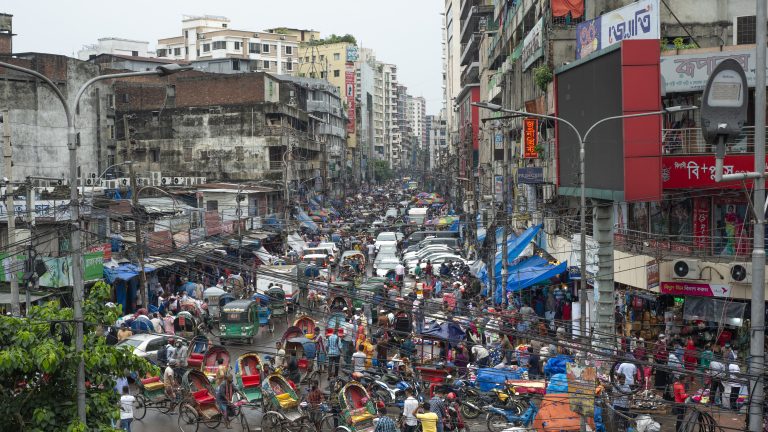In April 2020, in the midst of an ongoing national lockdown, Ahmed Imran Kabir decided to buy a parrot.
After most of the management classes Kabir taught at a university in Dhaka were canceled or moved online, he suddenly had plenty of time to focus on his passion project: becoming a part-time bird breeder. Sitting in his three-bedroom apartment one day, Kabir keyed in the phrase “Buy-sell birds Dhaka” on Facebook and joined about half a dozen groups dedicated to avian retail.
“Breeding pair. Age: 20 days. Contact by phone or inbox” read one post, alongside images of a pair of grayish-brown cockatiels. Another seller, located in the Kallyanpur neighborhood in Dhaka, posted pictures of yellow-feathered lutino cockatiels, with the Bengali phrase hat bodol hobe — which loosely translates as “to change hands.” The wording was intended to circumvent a Facebook algorithm that, to prevent wildlife trafficking, automatically takes down posts with “buy” or “sell” in the description. If an interested buyer did contact an owner, the next step was to haggle over the price of the bird on Facebook Messenger.
Kabir bought his first pair of birds from the 3,000-person Facebook group A.S.ককাটেল পাখি হাত বদল — “A.S. Cockatiel changes hands.” For that purchase, the seller delivered the birds in person to collect them, and Kabir paid in cash. He was so pleased with his decision that he bought 24 more pairs over the next two weeks, including breeds such as Gouldian finches, Bengalese finches, and crested Bengalese finches. Each pair cost anywhere between $15 and $60, depending upon the breed and its age. “At one point, I started running out of space to accommodate all the birds, and sent about half a dozen Bengalese finches, along with some Gouldians, to my fiancee’s place,” he recalled. Finally, he gave in and bought a large birdcage.
From discovery to delivery, this whole process happened on Facebook.
Kabir’s story is reflective of how the majority of e-commerce now happens in Bangladesh. In the absence of giant online marketplaces like Amazon, thousands of bespoke Facebook pages and groups have been created to meet customer demand for ornaments, apparel, cosmetics, mobile accessories, and, of course, birds.
The phenomenon has grown so much over the years that the number of stores on Facebook now eclipse the number of sellers on local e-commerce websites like Evaly, Ajkerdeal, or the Alibaba-acquired Daraz. No one knows exactly how many of these businesses exist, but the most recent estimates suggest that Bangladesh has over 300,000. The low barriers to entry — all an aspiring entrepreneur needs is an internet connection and around $350 to cover startup costs — present a tremendous opportunity for a generation of young Bangladeshis reeling from mass layoffs and fear of rising unemployment rates, which are projected to impact at least 15% of the working population. It also has opened other doors: in a country where just over 15 percent of women have mobile internet access, half of Facebook sellers are female.
By and large, these Facebook stores are usually window fronts for click-and-order shopping. Unlike in formal marketplaces, most sellers are not licensed, store their inventory at home, and partner with third-party logistics companies for last-mile delivery. It’s all very simple: after a buyer makes a selection, payments are arranged via off- or online methods, and items are delivered by mail. No equivalent exists in the West, where Facebook’s forays into commerce have been met with a muted response. For a 162-million-strong country struggling with poverty and limited job growth, this new model of business is illustrative of the South Asian concept of jugaad — making do with what’s available. And it already has a name: F-commerce.

Nuzhat Akhter has been selling on Facebook for only six years, but she’s already considered a veteran in the F-commerce sphere. Her site, Posh World, has over 8,000 followers on Facebook, thanks to her carefully cultivated selection of consumer goods. From her home in Bangladesh, Akhter sources all kinds of products — helmets, handbags, Ralph Lauren shirts, even branded car parts — and accepts preorders daily. If an item isn’t featured on her site, customers can send links or screenshots of things they want from any co.uk website. Customer service is handled via Messenger and her Facebook page, and Akhter guarantees delivery within two weeks.
The 34-year-old mother set up her Facebook store three months after the birth of her son in 2014 and has built a loyal following over the years. Akhter spends her mornings scouring the British websites of popular brands like The Body Shop, Superdrug, Clarks, and so on, hunting for flash sales or discounts. Once she finds a good deal, she shares the link on her Facebook group with screenshots: “3 hr left flash sale bodyshop 50%.” In June, orders totaled over $800. Akhter’s success is especially notable, as it’s uncommon to see a Bangladeshi woman running her own business. In many traditional South Asian households, women are discouraged from working after marriage.
The reason thousands of Bangladeshis depend on Akhter to do their shopping is that she has access to something very few of them do: a credit card, and an international one at that. “It’s my secret weapon,” Akhter said. To prevent money laundering, Bangladesh has issued roughly 1.5 million credit cards, and even those cards have a $300 transaction limit for international online purchases. This has created a boom in cross-border F-commerce and turned retail arbitrage into a thriving sector.
The rise of F-commerce has also inadvertently ushered in more-direct models of customer engagement, moving away from impersonal help pages and suggestion boxes. Qazi Fahimda Hasan, the 26-year-old founder of an F-commerce business that focuses on beauty and lifestyle products, has made this part of her brand’s identity. Through Facebook Messenger, she shares tips for identifying counterfeit products, such as checking for irregularities in packaging, spotting spelling errors, verifying barcodes, and so on. She also invested in a mini-photography studio to take professional photos and videos of her inventory. The pictures on her Facebook wall act as a real-time bulletin board for her click-and-order store.
Globally, the hottest new trend for online sellers is livestreaming. In China, consumers on Pinduoduo are using it to break into the $200 billion market for impulse and everyday purchases. In the United States, Amazon has been experimenting with Amazon Live Creator, which lets merchants set up streams to showcase their products. (So far, it seems to have had little success.) In Bangladesh, sellers go on Facebook Live to promote items, respond to questions, and take instant orders. Some products attract larger crowds than others.
“People simply go crazy for whitening creams,” said Akhter. “I mean, you could have 1,000 or 2,000 people watching a live demo on Facebook.” With little formal regulation, this is all based on trust. Many sellers aren’t concerned with looking glamorous or dressing up for the camera, and at first glance, their streams often come across as an ersatz version of the Home Shopping Network in the U.S.

Before the pandemic, a seller who goes by only Sulaiman would spend his evenings holding Facebook livestreams in front of multicolor sarees in his clothing shop, Symbol Fashion House, in Dhaka. Then, he was forced to change venues. In a twenty-minute stream from his living room, Sulaiman shows off a variety of clothes on offer, explaining the decorative stones on a salwar and the embroidery on a fabric. “Each of our chunni prints cost 550 taka [6$]. Take a screenshot and inbox the picture if interested,” Sulaiman exhorts viewers. Throughout the livestream, buyers flood the chat, asking to see more colors and sizes. “We started doing Facebook Live only about six months ago,” Sulaiman told Rest of World. Since then, he has averaged about $4,500 a month in online orders.
F-commerce emerged in Bangladesh largely because there was no major e-commerce platform to absorb all the business. But although it’s biggest there, this form of selling isn’t exclusive to the country, or even the region: globally, 160 million small stores operate on Facebook, and in countries like Thailand, almost half of all online sales happen through social media. Recently, platforms have started to accommodate them. Earlier this year, Facebook introduced features allowing sellers to customize their online shops and made it easier for them to catalogue their goods and process payments.
The rise of F-commerce is, of course, inextricable from Facebook. As whole sections of Bangladeshi society get online for the first time, many consider “being on the internet” as simply having registered on Facebook. According to one estimate, the social media giant had nearly 39 million active users in Bangladesh in May — 23.8% of the population. This widespread use has meant that F-commerce has expanded beyond cities like Dhaka, Chittagong, and Sylhet and pulled new kinds of consumers into online shopping.
“If Amazon were to enter, they could wipe out the market.”
It’s also changed other dynamics. While Bangladeshi F-commerce shops relied on snail mail until just a few years ago, many sellers have hired logistics firms to carry out their quality checks, packaging, and delivery services, as they’ve expanded their businesses. Apart from transporting goods, logistics firms such as eCourierz, ShopUp, and Paperfly are also responsible for collecting cash from consumers and transferring it to merchants. Almost all F-commerce payments are made via cash on delivery. Given the complications of transportation and delivery in Bangladesh — The New York Times once described “a good day for Dhaka’s drivers” as the equivalent of “the worst traffic jam in Mumbai or Cairo or Los Angeles” — the sector has exploded in recent years and is currently valued at $400 million. Paperfly is one of the bigger players: it has already partnered with over 3,500 Facebook sellers and delivers to all 64 administrative districts of Bangladesh.
These are boom times for F-commerce, but they may not last forever. Recognizing the potential of the sector, the government is actively courting foreign investment. This has made local players nervous. “If Amazon were to enter, they could wipe out the market,” said Paperfly cofounder Razibul Islam.

Just as Bangladesh went into a zone-based lockdown in June, Kabir, the bird seller, made his smartest purchase yet — mangoes. “I bought 2 kilograms of amrapali mangoes on Facebook,” he said proudly. On Amazon, a local mango seller might be buried among thousands of competitors. But on Facebook, that same seller has a number of ways to distinguish themself: they might share pictures of ripening fruit, hold livestreams to discuss their seasonal haul, or market their produce through targeted ads. Bolstering all this are the word-of-mouth referrals, which carry serious weight in Bangladesh.
The downside of such an informal system is that it also leads to the proliferation of scams. “As much as I use F-commerce, I’ve been a victim as well,” said Kabir, who in April bought a Netflix subscription through a Facebook page with over 15,000 followers. He paid a little more than $2 for a one-month standard subscription, but after four days, the scammer changed the password and deleted the page, depriving him of his account. In situations like this, there are no customer redress mechanisms at all.
“E-commerce in Bangladesh is not mature,” said Hafizur Rahman, who works for the Ministry of Commerce in Bangladesh. While the country’s overall online commerce industry is valued at around $1 billion (at least according to media reports), over 80% of internet commerce still takes place through networks of small entrepreneurs on Facebook. There are no standard refund policies, there is no legal framework, faulty products aren’t replaced, and there are only a few payment options.
“The biggest challenge for us is to connect Facebook sellers to the formal economy,” said the general secretary of the e-Commerce Association of Bangladesh, Abdul Wahed Tomal. Until strategic investment and regulation become part of the ecosystem, social commerce in Bangladesh can only develop organically.
But for now, business is as good as ever. Since April, Kabir has sold half a dozen pairs of Bengalese finches for a handsome sum. After a month spent in the hospital following a positive Covid-19 diagnosis, Kabir is currently self-isolating at home for the next two weeks. But once he recovers, he plans to return to bird breeding and, perhaps, might sell other items. He says that, as Dhaka is the most densely populated city in the world, “opening a Facebook page means that anything will be sold in one or two weeks.”





